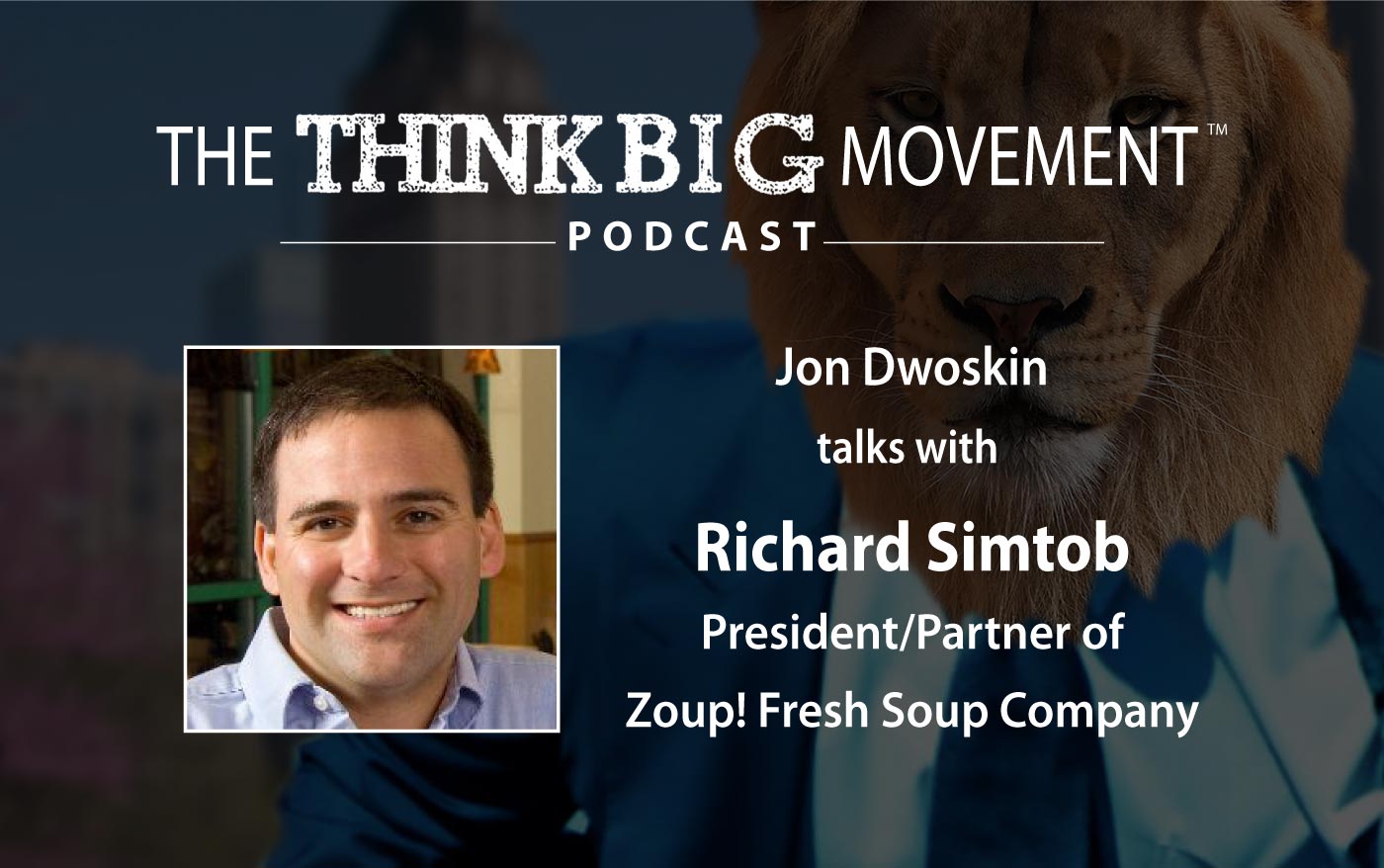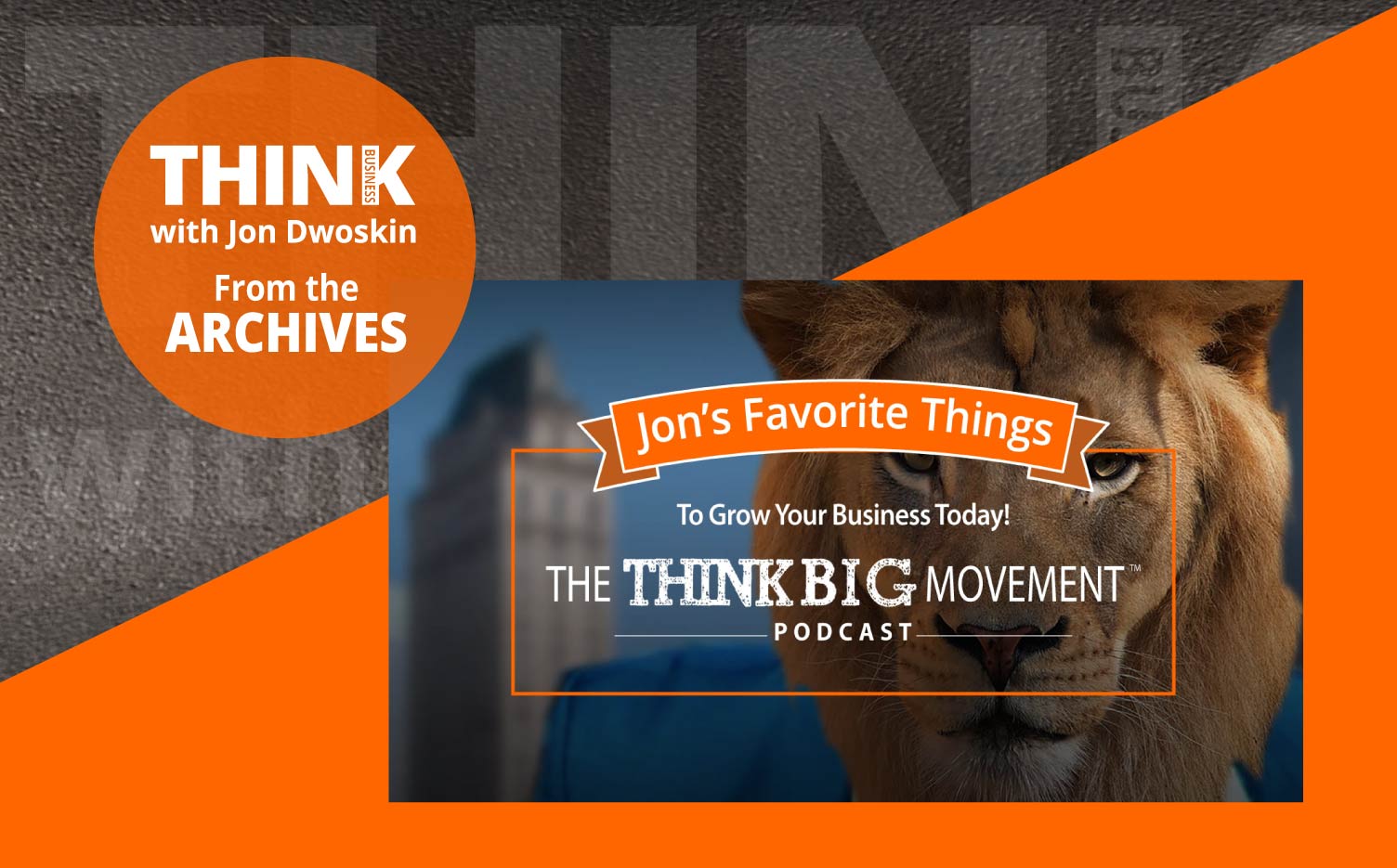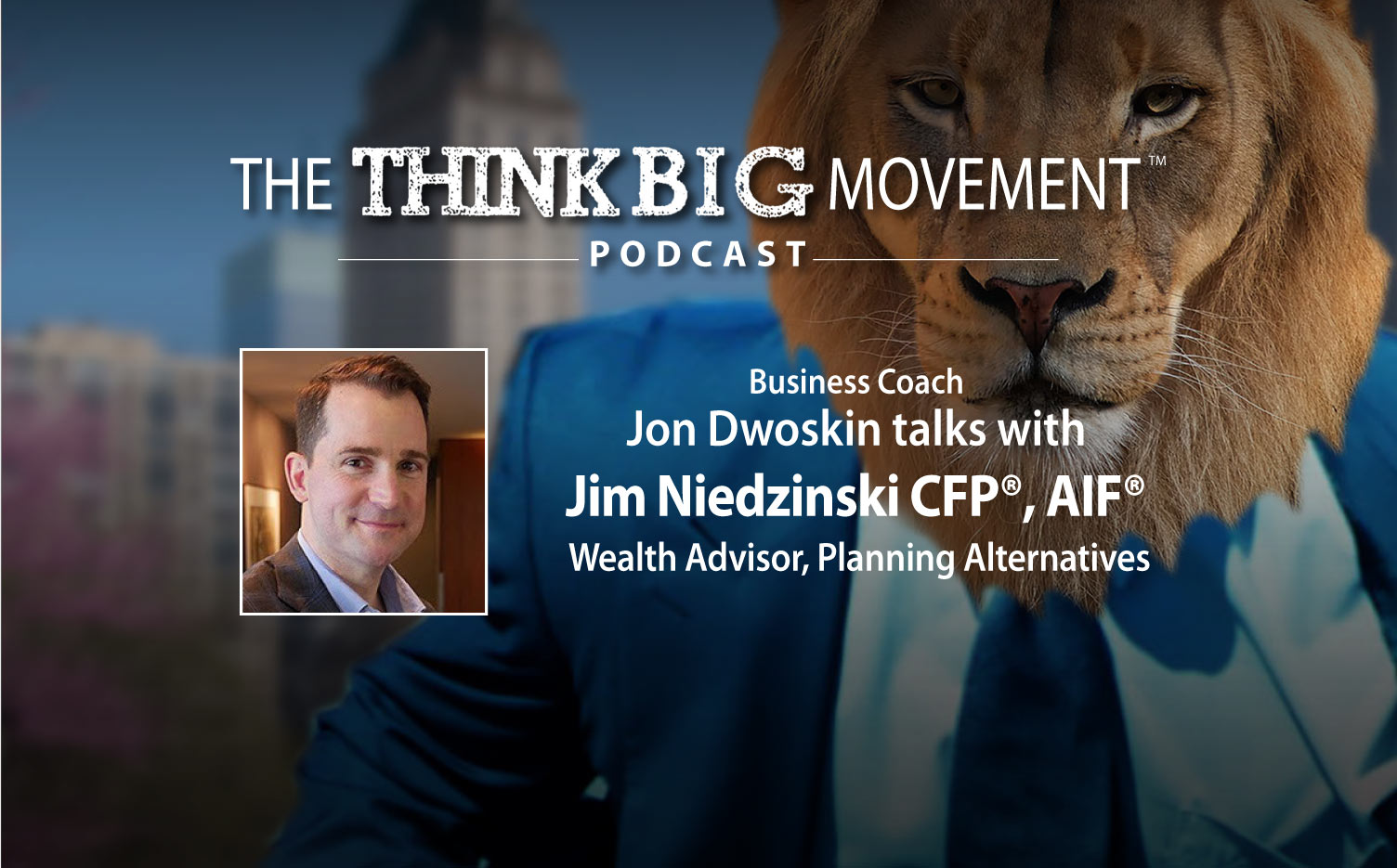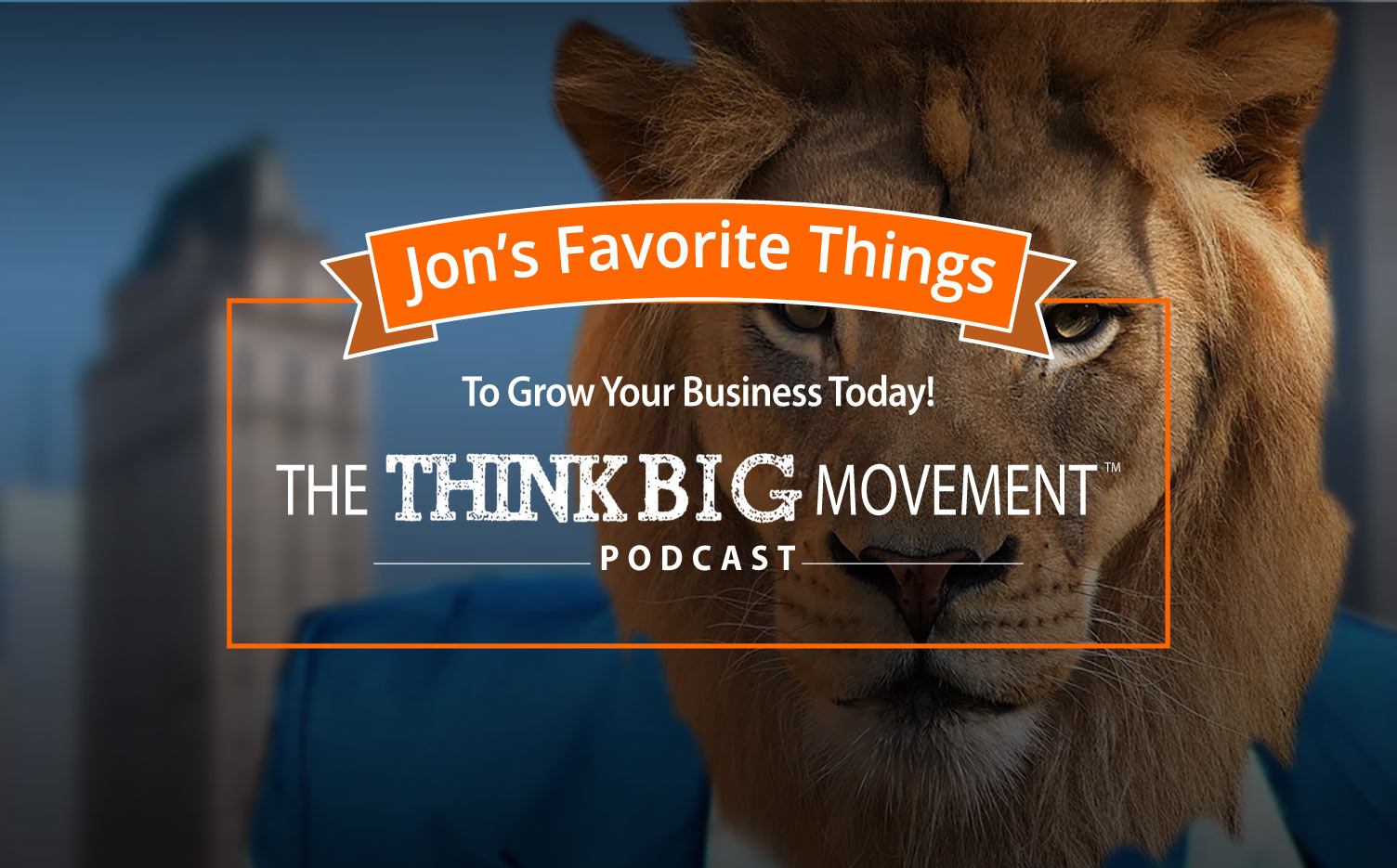
Read the transcript
Jon Dwoskin:
Hey, everybody. I’m Jon Dwoskin, an Executive Advisor and Business Coach, and we’re with successful business people who are stuck and want to take their company to the next level. Today, though, get ready to grow your business big. Very big. In just a few seconds, you’ll meet a dynamic business owner, executive, or sales person, willing to share the best practices that fuel their growth and success. Each interview is no more than 15-ish minutes long, so you can quickly learn effective tools to put into your business, today. Please listen with new ears, and let’s get to learning, let’s get to growing, and let’s get to thinking big.
Hey, everybody, and welcome back to the show. I want to welcome Richard Simtob to the show. He is an unbelievable business professional, with an amazing track record of incredible success. He was the founder of Talking Book, a world corporation, which was way ahead of its time as far as your ability to take books and put them on tapes. I was a huge fan of the company, and loved going there on a regular basis.
He also, is one of the founders of Zoup Fresh Soup Company, which is an incredible company. He is the president and partner there.
He was the former COO and owner of Wireless Toys. The Co-Founder of Franchise For Sale.com. He is a triathlete. He is a great person. I’ve known him for a long time, and Richard, fill in the gaps and tell us about you, and what makes you tick and successful. On top of that, he also has a bunch of franchises, and you’re just one hell of a businessman, with a huge resume. So, tell us a little bit about how you became an entrepreneur, what businesses you want to focus on today, and nuggets of information that people can listen to today, to either get them into their entrepreneurial world, and/or grow it. Welcome to the show.
Richard Simtob:
Thank you very much, Jeff. Pleasure to be with you.
Jon Dwoskin:
Jeff? Jon. You called me my brother.
Richard Simtob:
The only correction is that I am not the Founder of Zoup.
Jon Dwoskin:
Oh.
Richard Simtob:
The Founder of Zoup is Eric Ersher, and he started the company almost 20 years ago with his cousin. I joined the company and bought into the company seven years ago, and helped grow it to franchising. Really the best thing to talk about today is, franchising. If you’re talking to new people that want to think big and that want to do something big in the world, sometimes everyone wants to start their own thing and start from scratch. If you’ve never started a business before, I’m a big proponent of finding a business that you’re passionate about, and getting involved with a franchise that has a business process and a business system you can follow. And you can multiply it over and over again.
Zoup is a franchise of over 100 restaurants. Most of our franchisees, if they had decided to open up their own restaurant, they would, most of them, would have failed. It is really, really hard to open up a new restaurant from scratch. Because they bought into the franchise, we’re able to help them pick the right real estate. We’re able to offer them advice on how to train and hire people right from the beginning, and then having their menu, their pricing, and have deals set up for all their products and all their vendors, from all the equipment, from all the food, and also set up a marketing program to get them going and open. And then support them continuously.
When you own a business, no matter what business, you have questions, and there’s not a lot of people that you can ask to help. One of the things that I love about franchising is that there’s somebody to call that’s going to help you, that’s aligned with you to help you be successful.
Jon Dwoskin:
You know, that is so true. Talking about the support is critical. I think a lot of times people who want to get into a franchise have that entrepreneurial spirit, but they still need the guidance that you talked about. That ongoing support is so critical because I’m sure they always need to know what’s next. What happens if this happens? Hey, this just happened, and a lot of times when you do stuff on your own, you don’t have that person to call, who has been the trailblazer in front of you, to guide you on what to do. So, can you talk a little bit about that, as far as how that goes?
Richard Simtob:
Yeah. I’ll give an example. My younger brother, when he wanted to get into his first business, right out of college, he decided to get into the wireless franchise business. I was affiliated and I was a partner at Wireless Toys. I was helping them grow, and he wanted to become one of the first franchises in a brand new market. He didn’t know anything about really running a business. He had worked at business but being an owner, was really, really hard and it was a huge shift for him. He went to a new city. He moved from Toronto all the way to Phoenix, Arizona. He was helped by the whole company, to set up the right store from the beginning. But the biggest challenge he faced was dealing with people.
Hiring and managing employees I find to be the biggest challenge of every business out there. Through the franchise support system, they were able to send people to help support him, and help him and train, and really find the right people that can work for him, and also create an infrastructure, so he didn’t have to do everything himself. He was treating it almost like an independent business, and not taking all the advice, and what he was doing is, he was trying to be like an octopus, trying to put his hand in everything. Trying to touch everything, and following the advice from the franchise and/or the support team, he put different people in charge of different parts of the operation. So, one person was in charge of all the inventory of accessory. Another person was in charge of all the inventory of phones, and another person was responsible for the way the store looked when they came in, in the morning, and all of a sudden, by delegating and using the infrastructure that was created by Wireless Toys, he was able to operate a successful wireless retail store.
Jon Dwoskin:
That’s great. That’s great. I always say, business is easy. People make it difficult.
Richard Simtob:
True.
Jon Dwoskin:
It is really hard to manage people. But that’s great. I’ve known you for a long time, and you’ve known me. You’ve known my brother. You actually called me Jeff by mistake, in the beginning, I think, of this podcast. No worries, by any means. But you have such discipline. I just want you to talk about the discipline, and how you infuse that into your business, because you are an Ironman Triathlete, which requires a tremendous amount of discipline, especially to train for that, to build your business, and to be a dedicated family man, which I know you are. So, talk about the discipline and the balance, that you infuse into your life, so you can have a balanced life, and people can learn from your discipline in how you do that.
Richard Simtob:
Thank you. First of all, I’m so sorry for having done that.
Jon Dwoskin:
It’s no big deal. People do that to me sometimes. I’ve known you for a long time. You know my brother too.
Richard Simtob:
I know you, Jon.
Jon Dwoskin:
Right, right, right.
Richard Simtob:
Boston, you know. Jon, it is true, the hardest, probably, challenge I ever embarked on in my life was signing up for an Ironman. It takes all the discipline and everything I’ve done in my life, and really focused on one project, and it was a one-year commitment. But it’s no different than every business or every activity I ever started. I start with a clearly written, defined goal, with a timeline. The whole thing we start with is Smart Goals and this one is really specific. It really had a timeline, and it had a training plan to follow it. And then what made me able to stay disciplined was having partners with me doing it. No different than in business of having business partners or having people that you work with, or accountability partners, that help you. But I had three accountability partners with me, and then there were still eight people from Michigan that were all doing the same Ironman in Chattanooga.
So, I had all these people around me, pushing me, reminding me on those days I didn’t want to get out of bed that I had to get out of bed. Of course, no different than if you’re trying to build a business. Every day showing up to work and doing what needs to get done. It’s really, really hard when you’re by yourself. I have been successful in my business, all my businesses, with business partners, and I know a lot of people that have succeeded in businesses and start-ups all by themselves, without a partner, and I just find it to be so much harder, when you have a partner that you can share with, that you can bounce off of.
I think the synergy between Eric Ersher, the Founder of Zoup, and myself with my different skillset and energy, we enabled to grow Zoup from 18 to over 100 units in seven years, and it was because of the partnership there. I think neither of us could have done this alone. I could have never grown Zoup to 100 stores without him, and he knew he had tried already for 13 years before I was around, and he was able to get it to 18 units without me. So, it’s the synergy of the accountability partners, clearly defining goals. How do you stay balanced with family life? We set times. There’s times of date nights with my wife. I have time I know I’m going to be with my kids. You preplan family vacations far in advance, so your business works around your family time, instead of trying to squeeze in family time every minute of every day is dedicated to work. That’s how I’ve been able to do it.
Jon Dwoskin:
That’s incredible. I actually did a spring triathlon many, many years ago, and that was so intense, so I can’t even comprehend the Ironman, but congratulations again on that. That’s such an amazing accomplishment. But you talk about pre-planning, and I think that is so critical. What seems so obvious and such common sense, but I think most people don’t do that. That proactive pre-planning in life, whether it’s in Ironman or just in business: the importance of planning out your day, your week, your month, your year, your quarter, whatever it is, is so critical. I really appreciate you talking about the discipline of pre-planning. Let me ask you a question. So, I think one of the things also, when we’re talking about balance, is the balance of working hard and work hard, play hard, family life balance, but you’re also very plugged in as far as from a charitable standpoint, and I know that’s an important part of your life. You’re an active member of the Jewish Entrepreneur’s Network, and Entrepreneur’s Network of Michigan, and you’re past President of Yezwa, a non-profit food bank, and your companies have been recognized by Entrepreneur’s List of Top 500 Franchises. You’re very involved in the community. So how important is that to your work/life balance?
Richard Simtob:
I think it’s really important. For a long day at the office, doing things for work and basically focusing on building an enterprise, it is sometimes a relief to go to a non- profit board meeting where I can help people in need and create policies and programs before I come home. I’ve been on the board of Yetta’s for 19 years, so there’s a huge involvement there, and I find it’s such a basic need – people having food.
I do feel an obligation to give back to the community that’s helped me be successful. But I don’t do it just because it’s an obligation. It actually feels great. There’s times before you go to a charitable organization, or a board meeting, or an activity that you’re going to be doing some volunteer work, and you’re like, “God, I really wish I could just go home now. I’ve just worked a nine hour day. I’d love to go home and just rest.”
Instead, I go and I always leave energized, excited, and so happy I chose to do that, instead of just going home that night. I said that many times to my wife. I said, “I just feel so pumped up. It gives me more energy, that it gets me excited for the next day, for what I’m going to do.” And it doesn’t hurt. You get different skillsets. I’ve been able to take skillsets of running a meeting – trying to get something changed in the non-profit world is not easy – and using that skillset, and then bringing it over to the business world. So, I’ve had some experience, met people, and had a lot of fun, and I’ll continue to always give back to the community in the best ways that I can and help.
Jon Dwoskin:
Good. I love it. I couldn’t be with you more as to how fulfilling it is to the soul and just how it refuels you. I think it’s outstanding. Well said. Well said. So, in our last couple minutes together, talk about any favorite book, favorite article, favorite podcast, favorite piece of advice, favorite … Anything that our listeners today can listen to and maybe put into their world that can help them grow their business?
Richard Simtob:
So, someone’s listening to this and they’re early in their career, or even middle of their career and they really want to give themselves a jump-start, I have to plug my favorite author, which I believe happens to be yours, introduced to me by my mother and to you by your father: Brian Tracy.
Jon Dwoskin:
Yes.
Richard Simtob:
Not a day goes by that I don’t think of some of the words of wisdom that I got to listen to him when I was 17 years old, driving in Toronto, an hour downtown, and an hour back, running a business, and facing a lot of obstacles. I had someone talking to me in my ear, telling me I could do anything I want in this world. That everything in this world is going to happen because I designed it, because I’m going to make it happen.
My favorite book was called, The Universal Laws of Success and Achievement. I’ve probably listened to it over 50 times. If I was to listen to it now, I’d probably know parts of it by heart. I know what he’s going to say before he says it. He sort of brainwashed me. He brainwashed me that I was going to have the life that I wanted, and the life that I chose, and it helped me.
Another program that I believe in, that I just sent my son to, and I’m so happy at 16 he’s doing it. I did it when I was 17. It’s called the Dale Carnegie Course. It’s a 12-week program of four hours a week, and it really gave me some tools, and ability to learn how to treat and deal with other people. I have taken parts of that course, and I’ve used it to teach hundreds of swim school teachers that work for me in the swim school business that I own and I feel like I’m helping these 18 to 22 year olds become better people to each other, and better people in the community, by teaching the human relation principles that Dale Carnegie teaches.
Jon Dwoskin:
I love it. You’re doing the same thing for your son that your mom did for you. You and I have spent a lot of time talking about Brian Tracy. My Dad gave me a set of tapes at 18, and he said, “I think you’ll learn more from people like Brian Tracy, a psychology of success, than you will college.” I obviously graduated college, but became a self-studier of all of these people, just like you, and they have been a huge influence in my life. I loved the two stories you just told, as far as for you and Dale Carnegie for your son. It’s never too soon to get your kids thinking entrepreneurial, as an entrepreneurial mindset, and to begin building their confidence from the inside out. Which I think Dale Carnegie does such a great job with that, in providing tools.
Richard, you shared just such incredible insights today and I’m really grateful that you took the time to be on today’s show. Thank you so much. Just in closing, anything else you want to chat about? And tell people how they can get ahold of you.
Richard Simtob:
Sure. Well, first off, Jon, I want to thank you. One of the non-profit organizations I recently got involved with is called Tamra Camps. They have an outdoor education department which does teen building activities, offset retreats for the day for the night, for three days. Really, really cool, and it’s sort of the hidden gem of Michigan that people don’t know about. I’ve used it as a resource for my company a couple times and they’ve been incredible experiences.
Jon Dwoskin:
Yeah, me too.
Richard Simtob:
They’ve asked me to lead this non-profit activity, and grow it, and one of the first things I did, after understanding how it worked, was we had no one in charge of business development. I immediately called you. I said, “I’m hiring somebody for this new role. Would you help? It’s a non-profit that could really use your special, unique ability, and expertise.” And you immediately agreed to do it, and I’m really excited about that.
Jon Dwoskin:
I appreciate that. Thank you. I’m honored to be part of it and give back.
Richard Simtob:
Yeah, and I think we’ll both feel great at the end when this does become successful, and more companies can take advantage of team building and outdoor activities that really bring teens closer together and work better together. To get hold of me, I am easy. My name, Richard at Simtob.com. My last name is S-I-M-T-O-B then .com. So, richard@simtob.com. The website simtob.com just goes to my LinkedIn page so people know who I am. I love meeting with people that are looking to buy their first franchise or get started in a business and they just want someone to talk to for an hour. I love taking meetings like that, helping other people. Hopefully, avoid some of the mistakes that I made when I was younger.
Jon Dwoskin:
That’s great. That’s great. You’re a good man. You do amazing things, and it’s been great watching you grow, your career through the years, and it’s fun to continue to watch. So, thank you for sharing all your incredible wisdom today and, again, thank you. I’m really grateful to have you on the show. Have an amazing rest of the day.
Richard Simtob:
You too. Thank you so much, Jon.
Jon Dwoskin:
All right, Richard. Thanks so much.
Thank you for listening to the Think Big Movement Podcast. For show notes and links to anything we talked about, please visit jondwoskin.com. For additional best business practices, you may enjoy my latest book, The Think Big Movement: Grow Your Business Big, Very Big.
Lastly, if you want to talk to me about advising and coaching your business, please email me: jon@jondwoskin.com, text or call me at (248) 535-7796. Have an amazing day, an amazing week, and as always, think big.



